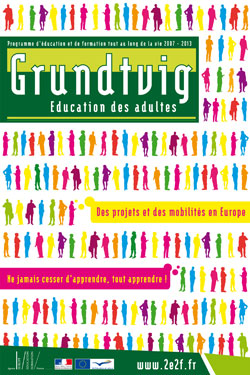 |
Projet Grundtvig YODUL LES JEUNES ET ADULTES: PARTENAIRES DANS UN DIALOGUE INTERGENERATIONNEL |
Partenaires
ORHANELI HALKA Egitim Merkezi TR-Turquie
CEPAPUB Rosalia de Castro ES-Espagne
SILALES SUAUGUSIUJU BENDROJO LAVINIMO VIDURINE MOKYKLA - Lthuanie
INSTITUT E-SENIORS FR-FRANCE
Horam Thesprotias GR-Grèce
D.1. SOMMAIRE
Comme nous le savons tous, un adulte est une personne qui se trouve hors du processus d'éducation formelle, indépendamment de son âge. Comme les adultes sont hors de ce processus crucial, le besoin se fait sentir d’utiliser un terme plus générique que nous appellerons «l'éducation des adultes». En des termes généraux, l'éducation des adultes recouvre la pratique de l'enseignement aux adultes à travers une éducation informelle. Cependant, à cause de problèmes environnementaux, sociaux et autres, certains adultes à travers l'Europe n'ont pas la possibilité d'accroitre leur qualité de vie. Dans ce contexte, se pose le problème de la communication avec les jeunes générations. Les adultes ne peuvent pas exprimer, ni transmettre aux jeunes, par eux-mêmes. Les Jeunes, d’un autre côté ne peuvent pas comprendre ce que les adultes savent, ressentent, et ont vécu. Nous essayons de surmonter cette difficulté en augmentant la qualité de vie des adultes ainsi que celle des liens de communication avec les jeunes.
Le but du projet YODUL ((the YOung and aDULts ; jeunes et des adultes) est d’identifier et de développer des méthodes innovantes afin d’améliorer le dialogue intergénérationnel dans les pays européens, puis, de diffuser le plus largement possible les bonnes pratiques et les résultats. Développer la collaboration entre les adultes et les jeunes dans les normes de l'UE, et organiser des rencontres et des dialogues afin d’améliorer la collaboration au profit des adultes dans le système éducatif européen est le but du projet.
Chacun des cinq partenaires à partir d'un éventail d'institutions réparties sur cinq pays, établira des contacts avec des adultes, des écoles et des intervenants d'autres parties prenantes de la communauté locale afin d'assurer la participation et l'appropriation nationale du projet. Les collectivités locales peuvent agir en tant que partenaires et seront impliqués dans l'enquête.
D.3. OBJECTIFS DU PROJET ET STRATÉGIE
Objectif à long terme:
Augmenter la qualité de vie des adultes qui n'ont pas été en mesure d’avoir une éducation de base, pour des raisons diverses, en améliorant leur vie et leur capacité cognitives, afin de leur redonner un rôle actif dans la société.
Objectifs à court terme:
A) Renforcer les standards de vie des adultes dans les pays participants.
B) Permettre la communication entre les adultes et les jeunes et l'augmenter par le biais de l'interaction, du dialogue et de la communication.
C) Pour faire accepter aux adultes l'idée d’une adaptation au monde moderne.
D) établir des partenariats entre les jeunes et les adultes, et améliorer l’estime de soi et la conscience de travailler ensemble.
E) Faire naître et partager des exemples de méthodes et de bonnes pratiques entre nos partenaires.
F) Utiliser des TIC pour la communication et la diffusion au sein du partenariat, ainsi qu'inviter les adultes à en faire usage
G) Fournir aux adultes les informations de base sur la nutrition, la santé, les base de connaissances mathématiques et, surtout, l'alphabétisation.
H) Développer les cultures des pays participants.
En général, les objectifs sont directement liés aux objectifs opérationnels de Grundtvig 1 et 2 [voir la section E.1], et plus précisément les suivantes, comme par exemple: CRANE-OpObj-3; OpObj-4-grue, grue-Op Obj -6. La composante TIC dans notre projet est également importante, mais elle est utilisée comme un moyen pour communiquer, recueillir et diffuser les résultats et l'évaluation de notre projet. Par ailleurs, nous tenons à souligner que dans YODUL, nous avons également pris en considération les priorités nationales (le cas échéant) des institutions participantes dans les pays de YODUL, ainsi que celles de l'Europe.
Comme nous venons de le dire, nous aimerions parvenir à une participation réelle et effective des adultes dans les systèmes éducatifs en améliorant la communication intergénérationnelle.
Nous croyons que l'éducation des adultes est un atout formidable pour la communauté éducative, et outre cela, nous avons besoin de nous attaquer à ces questions en raison de l’importance qu’elles prennent dans les sociétés européennes.
D.4. Produits et résultats
Un questionnaire sera préparé pour les adultes qui n'ont pas les compétences de base et les aptitudes cognitives.
Un logo du projet sera créé
. Ce logo permettra au projet d'être connu nationalement et internationalement.
Le site officiel du projet sera probablement "www.yodul.com".
Le questionnaire (août-sept. 2011) sera traduit dans les langues des pays participants.
Les résultats du questionnaire seront présentés et médiatisé sur le site. Des brochures seront préparées pour que le projet soit connu le plus largement possible.
Des activités culturelles auront lieu dans les médias nationaux. Ces activités sont basées sur celles qui sont en danger de disparaître.
Des réunions entre les jeunes et les adultes seront organisées. Les problèmes des adultes seront débattus il leurs sera donné la possibilité de résoudre ces problèmes de façon créative.
Rapport final d'évaluation du projet
G.2. PROGRAMME DE TRAVAIL
Turquie: La première réunion de projet: l'échange d'informations sur le projet, la discussion des documents du projet, des idées sur la réalité du projet par rapport au questionnaire et la validation du logo.
France: La deuxième réunion: la discussion générale du questionnaire, la mise en place des études jusqu’à cette date et, si nécessaire la mise à jour du projet.
Espagne: évaluation interne à mi-parcours. Echange d'idées sur les principaux cours et séminaires à venir en termes de normes européennes.
Lituanie: Evaluation du projet et attribution des certificats aux participants principaux. Une évaluation sera faite sur le site.
Soirée d'adieu.

